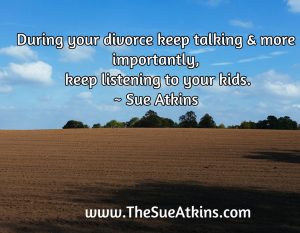


Like it? Share it!

One of the many questions I get asked when I am working with families going through a divorce is: “My child seems to have little reaction to our divorce. Does that mean they are OK? “
Divorce is usually a difficult time for all family members. However, in the end, the majority of children come through the divorce process intact. Children are resilient and typically experience several difficult emotional events during their childhood – a best friend who moves away, the death of a grandparent or favourite family pet, to even when you move house or they change nursery. Most children can handle some stress in their lives and they take their lead from you in how you handle life’s ups and downs. If you seem calm and confident they feel relaxed and assured. Most children will be sad, upset, angry or scared about the changes to their family life that divorce will bring but they will recover and grow as we all do from new experiences. So make sure you have the support and help you need during this challenging and stressful time, as you are a role model in all that you do and say, and you are creating memories that will last a long time.
All families are different and some children have significant difficulties during the divorce process. They experience fear, anger, sadness and grief. Frequently, they keep these feelings to themselves during this difficult time because they don’t want to burden you at this stressful time. Often parents will tell me how well their child is dealing with the ongoing divorce. However, when I see the child they express deep emotions and concerns that their parents are unaware of. Sometimes a few sessions with a professional can alleviate these fears and improve communication within the family.
Keeping the lines of communication open and asking good questions, regularly and informally, helps your child express their feelings healthily and a child who feels heard feels understood.
If your child suddenly starts doing poorly in school, becomes aggressive or withdrawn, or experiences lots of crying spells, do seek some professional help. It is not weakness to ask for help during one of Life’s most stressful events. Some children, with additional needs may be more vulnerable to begin with and they will have a more difficult time during the divorce so keep talking, and more importantly listening, through asking simple questions.
Separation and divorce are traumatic events for families.
This journal is designed to help children express, explore and understand some of the strong emotions that they may be feeling and to help them process the divorce for themselves.
Keeping a Journal is a very simple, but powerful way to support children.
As caring adults, we can help by simply acknowledging & listening to how a child may be feeling, without trying to “fix it”.
This Journal is designed to support open and honest communication and to help children feel heard, understood and supported during a time of great upheaval.
Buy your copy now
Discussing every possible aspect of parenting, giving you advice and support on topics which affect your daily life. Each free, weekly episode is bursting with practical tips, techniques and ideas.
I will teach you my no-nonsense, simple techniques & give you hundreds of my expert parenting articles, videos & podcasts so you can get back to the business of having fun with your family!



